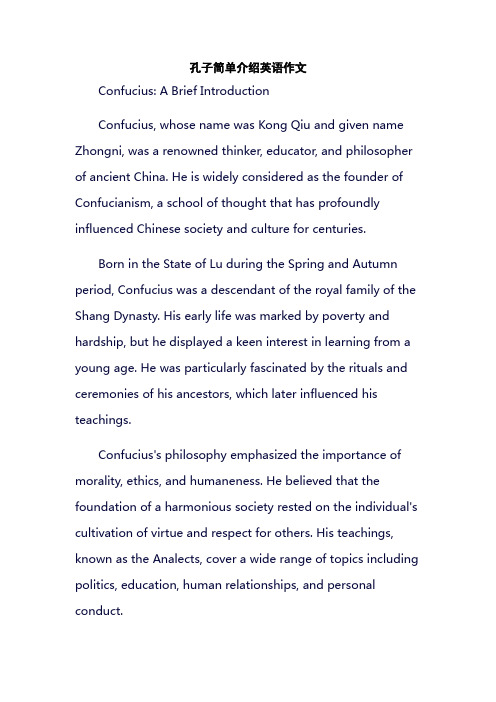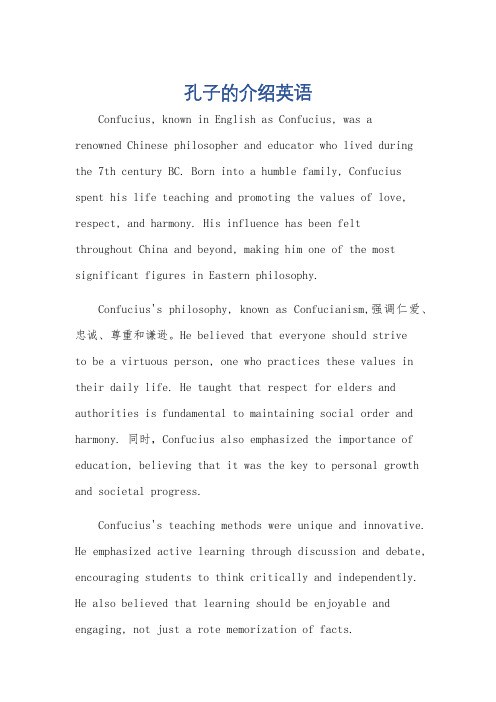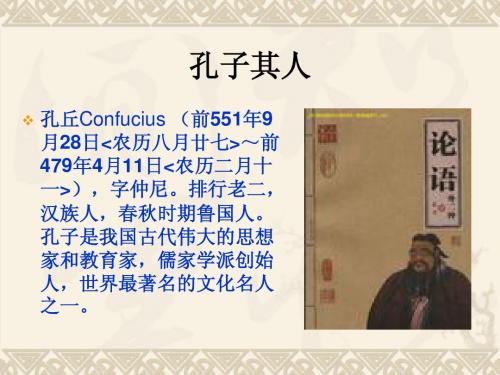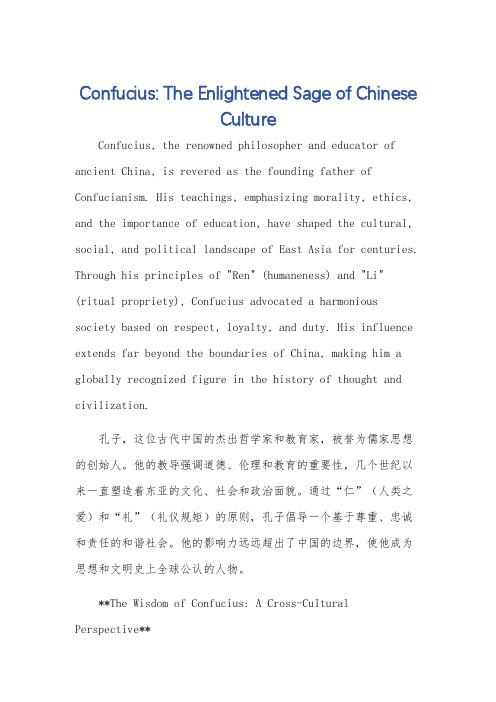Confucius孔子介绍
孔子简单介绍英语作文

孔子简单介绍英语作文Confucius: A Brief IntroductionConfucius, whose name was Kong Qiu and given name Zhongni, was a renowned thinker, educator, and philosopher of ancient China. He is widely considered as the founder of Confucianism, a school of thought that has profoundly influenced Chinese society and culture for centuries.Born in the State of Lu during the Spring and Autumn period, Confucius was a descendant of the royal family of the Shang Dynasty. His early life was marked by poverty and hardship, but he displayed a keen interest in learning from a young age. He was particularly fascinated by the rituals and ceremonies of his ancestors, which later influenced his teachings.Confucius's philosophy emphasized the importance of morality, ethics, and humaneness. He believed that the foundation of a harmonious society rested on the individual's cultivation of virtue and respect for others. His teachings, known as the Analects, cover a wide range of topics including politics, education, human relationships, and personal conduct.As an educator, Confucius established the private school system in China. He advocated for education to be accessible to all, regardless of social status or wealth. He believed that education was the key to personal growth and social progress. Under his guidance, thousands of students flocked to his school, seeking wisdom and guidance.Confucius's legacy continues to influence Chinese society and culture to this day. His teachings have been adapted and reinterpreted over the centuries, but the core principles of morality, ethics, and humaneness remain relevant and enduring. Confucianism has also spread beyond China, influencing cultures and societies around the world.In conclusion, Confucius was a visionary thinker and educator whose ideas have transformed Chinese society and culture for generations. His legacy continues to inspire and guide people around the world in their pursuit of wisdom, virtue, and social harmony.。
孔子的介绍英语

孔子的介绍英语Confucius, known in English as Confucius, was a renowned Chinese philosopher and educator who lived during the 7th century BC. Born into a humble family, Confucius spent his life teaching and promoting the values of love, respect, and harmony. His influence has been feltthroughout China and beyond, making him one of the most significant figures in Eastern philosophy.Confucius's philosophy, known as Confucianism,强调仁爱、忠诚、尊重和谦逊。
He believed that everyone should striveto be a virtuous person, one who practices these values in their daily life. He taught that respect for elders and authorities is fundamental to maintaining social order and harmony. 同时,Confucius also emphasized the importance of education, believing that it was the key to personal growth and societal progress.Confucius's teaching methods were unique and innovative. He emphasized active learning through discussion and debate, encouraging students to think critically and independently. He also believed that learning should be enjoyable and engaging, not just a rote memorization of facts.Confucius's influence has been felt in various aspectsof Chinese culture, including art, literature, politics,and even daily life. His teachings have been incorporated into Chinese law and have shaped the way Chinese peopleview their roles in society. Confucian values such as respect, harmony, and virtue are still highly valued in Chinese culture today.Outside of China, Confucius's influence has also been felt. His teachings have been translated into various languages and have influenced thinkers and philosophers worldwide. The United Nations Educational, Scientific and Cultural Organization (UNESCO) has even designatedConfucius as one of the world's most important thinkers, recognizing his significant contribution to human civilization.In conclusion, Confucius is a remarkable figure in both Chinese and global history. His philosophy of love, respect, and harmony has shaped the way people think and behave for centuries. His innovative teaching methods and dedicationto personal growth have made him a role model for educators worldwide. As we move forward in the 21st century, it isimportant to remember the wisdom of Confucius and the valuable contributions he has made to human civilization.**孔子:东方智慧的典范**孔子,这位在公元前7世纪的中国著名哲学家和教育家,以孔子的名字为英语世界所熟知。
孔子的介绍

1
孔子学院,即孔子学堂(Confucius
Institute ),它并非一般意义上的大学,而是推广汉 语和传播中国文化与国学的教育和文化交流 机构,是一个非营利性的社会公益机构,一 般都是下设在国外的大学和研究院之类的教 育机构里。孔子学院最重要的一项工作就是 给世界各地的汉语学习者提供规范、权威的 现代汉语教材;提供最正规、最主要的汉语 教学渠道。孔子学院总部(Confucius Institute Headquarters)设在北京,2007年 4月9日挂牌。境外的孔子学院都是其分支机 构,主要采用中外合作的形式开办。
前数千年之文化赖孔子以传,自
孔子以后数千年之文化赖孔子而
开。
——柳诒徵《中国文化史》
孔子: 一个志在报国又无人 重用的闲人
一个周游列国、苦寻
门路的忙人
一个到处碰壁、从不
回头的强人
四大圣哲
发愤忘食,乐以忘忧
孔子62岁时,曾这样形容自己:“其为 人也,发愤忘食,乐以忘忧,不知老之将至 云尔。”当时孔子已带领弟子周游列国9个年 头,历尽艰辛,不仅未得到诸侯的任用,还 险些丧命,但孔子并不知难而退,仍然乐观 向上,坚持自己的理想,甚至是明知其不可 为而为之。
安贫乐道
子曰:“不义而富且贵,于我如浮云” ,在孔子心目中,行义是人生的最高价值, 在贫富与道义发生矛盾时,他宁可受穷也不 会放弃道义。但他的安贫乐道并不能看作是 不求富贵,只求维护道,这并不符合历史事 实。孔子也曾说:“富与贵,人之所欲也; 不以其道,得之不处也。贫与贱,人之所恶 也;不以其道,得之不去也。”“富而可求 也,虽执鞭之士,吾亦为之。如不可求, 从 吾所好。”
学称,对于各种知识都表现 出浓厚的兴趣,因此他多才多艺,知识渊博 ,在当时是出了名的,几乎被当成无所不知 的圣人,但孔子自己不这样认为,孔子曰: “若圣与仁,则吾岂敢?抑为之不厌,诲人 不倦。” 孔子学无常师,谁有知识,谁那里 有他所不知道的东西,他就拜谁为师,因此 说“三人行,必有我师焉,择其善者而从之 ,其不善者而改之。”
介绍孔子思想的英语作文

介绍孔子思想的英语作文Confucius, also known as Kong Zi, was a Chinese philosopher who lived in the Spring and Autumn period. 孔子,也被称为孔子,是生活在春秋时期的中国哲学家。
He is widely considered to be one of the most influential thinkers in Chinese history. 他被普遍认为是中国历史上最具影响力的思想家之一。
His teachings and philosophy have had a lasting impact on Chinese culture and society. 他的教导和哲学对中国文化和社会产生了持久的影响。
Confucius' thoughts revolve around the importance of moral values, personal development, and social harmony. 孔子的思想围绕着道德价值观、个人发展和社会和谐的重要性展开。
One of the key concepts in Confucius' philosophy is the idea of Ren, which can be translated as benevolence or humaneness. 孔子哲学中的一个关键概念是仁,可以翻译为仁爱或人心。
He believed that cultivating a sense of compassion and empathy towards others is essential for creating a harmonious and well-functioning society. 他认为培养对他人的同情和共情感是创造和谐和良好运行社会的关键。
介绍孔子文案英文作文翻译

介绍孔子文案英文作文翻译English:Confucius, also known as Kongzi or Kongfuzi, was a Chinese philosopher and educator who lived from 551 BC to 479 BC. He is widely considered one of the most influential figures in Chinese history, and his teachings have had a profound impact on Chinese culture and society.Confucius emphasized the importance of moral values such as benevolence, righteousness, propriety, wisdom, and sincerity. He believed that cultivating these virtues was essential for creating a harmonious and just society. For example, he often talked about the concept of "ren," which can be translated as "benevolence" or "humaneness." Confucius taught that people should treat others with kindness and empathy, fostering strong relationships and social cohesion.Another key aspect of Confucianism is the importance offilial piety, or respect for one's parents and ancestors. Confucius stressed the role of the family as the foundation of society, and he believed that filial piety was essential for maintaining social order and stability. He famously said, "Respect yourself and others will respect you." This emphasizes the idea that by showing respect to our elders and ancestors, we earn the respect of others and contribute to a harmonious community.Confucius also emphasized the importance of education and self-cultivation. He believed that everyone had the potential for self-improvement through learning and moral reflection. He famously said, "Education breeds confidence. Confidence breeds hope. Hope breeds peace." This highlights the transformative power of education in shapingindividuals and society for the better.Overall, Confucius's teachings continue to resonate today, not only in China but also around the world. His emphasis on moral values, family, education, and social harmony remains relevant in an increasingly interconnected and diverse world.中文:孔子,又称孔子或孔夫子,是一位生活在公元前551年至公元前479年的中国哲学家和教育家。
介绍孔子50字英语作文

Confucius: The Enlightened Sage of ChineseCultureConfucius, the renowned philosopher and educator of ancient China, is revered as the founding father of Confucianism. His teachings, emphasizing morality, ethics, and the importance of education, have shaped the cultural, social, and political landscape of East Asia for centuries. Through his principles of "Ren" (humaneness) and "Li" (ritual propriety), Confucius advocated a harmonious society based on respect, loyalty, and duty. His influence extends far beyond the boundaries of China, making him a globally recognized figure in the history of thought and civilization.孔子,这位古代中国的杰出哲学家和教育家,被誉为儒家思想的创始人。
他的教导强调道德、伦理和教育的重要性,几个世纪以来一直塑造着东亚的文化、社会和政治面貌。
通过“仁”(人类之爱)和“礼”(礼仪规矩)的原则,孔子倡导一个基于尊重、忠诚和责任的和谐社会。
他的影响力远远超出了中国的边界,使他成为思想和文明史上全球公认的人物。
**The Wisdom of Confucius: A Cross-CulturalPerspective**Confucius, a legendary figure in Chinese history,stands as a beacon of wisdom and morality. His teachings, centered around the concepts of "Ren" (humaneness) and "Li" (ritual propriety), promote social harmony and ethical behavior. His influence extends beyond the borders of China, resonating with people across the globe who seek guidancein living a virtuous life.Confucius' emphasis on education as a means to personal and societal growth is particularly relevant in today's world, where knowledge and wisdom are more accessible than ever before. His belief in the transformative power of learning resonates deeply, reminding us that education is not just about acquiring facts but about cultivating character and fostering empathy.Moreover, Confucius' philosophy提倡a respect for tradition and the value of hierarchy, which, while contextualized to the Chinese cultural context, also speaks to the universal human desire for stability and order. His teachings on filial piety and respect for elders, for instance, are not just cultural practices but universalvalues that promote social cohesion and intergenerational understanding.In the globalized world of today, where cultural exchanges and understanding are paramount, the wisdom of Confucius offers a valuable perspective. His teachings on the importance of personal integrity, social responsibility, and the pursuit of excellence in all endeavors are timeless and universally applicable. By embracing the principles of Confucianism, we can work towards building a more harmonious and understanding world.孔子,这位中国历史上的传奇人物,是智慧和道德的灯塔。
六年级英语作文介绍孔子
六年级英语作文介绍孔子Confucius, also known as Kong Zi, was a great philosopher, educator, and statesman in ancient China. He was born in 551 BC in the state of Lu, which is now part of present-day Shandong Province. Confucius is widely regarded as one of the most influential figures in Chinese history and his teachings continue to have a profound impact on Chinese culture and society.Confucius' philosophy emphasized the importance of moral values, social harmony, and personal integrity. He believed that individuals should strive to cultivate themselves morally and fulfill their social responsibilities. Confucius emphasized the concept of "ren," which can be translated as benevolence or humaneness. He believed that by practicing ren, individuals could achieve personal growth and contribute to the betterment of society.As an educator, Confucius emphasized the importance of learning and self-improvement. He believed that education was the key to personal and societal development. Confucius advocated for a well-rounded education that included not only academic knowledge but also moral and ethical teachings. He believed that education should cultivate individuals' character, foster a sense of social responsibility, and promote harmony within society.Confucius was also a statesman and served as an advisor to several rulers during his lifetime. He believed that good governance was essential for a stable and prosperous society. Confucius emphasized the importance of virtuous leadership and believed that rulers should lead by example and govern with fairness and compassion. He believed that a just and righteous ruler would inspire the people to follow moral principles and contribute to the overall well-being of society.Throughout his life, Confucius traveled extensively, seeking opportunities to spread his teachings and promote his ideals. He attracted a large following of disciples who studied his teachings and carried on his legacy. The Analects, a collection of Confucius'sayings and teachings, became one of the most important texts in Chinese philosophy and has been studied for centuries.Confucius' teachings continue to be highly respected and influential in modern China. His emphasis on moral values, social harmony, and personal integrity resonates with many people. Confucianism has become an integral part of Chinese culture and has shaped the values and beliefs of generations of Chinese people.In conclusion, Confucius was a remarkable figure in Chinese history. His philosophy, teachings, and ideals have had a lasting impact on Chinese society. Confucius' emphasis on moral values, education, and good governance continue to be relevant and importantin the modern world. His teachings serve as a guide for individuals seeking personal growth and societal harmony. Confucius' legacy as a philosopher, educator, and statesman will always be remembered and revered in Chinese history.。
介绍孔子的英语作文
介绍孔子的英语作文英文回答:Confucius, also known as Kong Zi, was a Chinese philosopher and educator who lived during the Spring and Autumn Period of Chinese history. He was born in 551 BC in the state of Lu, which is now part of present-day Shandong Province in China. Confucius is widely regarded as one of the most influential figures in Chinese history, and his teachings have had a profound impact on Chinese society and culture.Confucius was known for his emphasis on moral values, social harmony, and the importance of education. One of his most famous sayings is "Do not do to others what you do not want done to yourself." This reflects his belief in the importance of treating others with kindness and respect. He also emphasized the importance of filial piety, or the respect for one's parents and ancestors, as a fundamental virtue in society.In addition to his moral teachings, Confucius also placed a strong emphasis on the importance of education. He believed that education was the key to personal and social advancement, and he established a set of ethical and moral guidelines for his students to follow. Confucius' teachings were compiled into a book called the Analects, which has been studied and revered for centuries.Confucius' influence extends far beyond China, and his teachings have also had a significant impact on other East Asian countries, including Japan, Korea, and Vietnam. His emphasis on the importance of moral values and social harmony continues to resonate with people around the world.中文回答:孔子,又称孔子,是中国古代的一位伟大的思想家和教育家。
关于孔子介绍的英语作文演讲稿
关于孔子介绍的英语作文演讲稿English:Confucius, also known as Kong Zi, was a Chinese philosopher and educator who lived during the Spring and Autumn Period of ancient China. He is widely regarded as one of the most influential figures in Chinese history, and his teachings have profoundly shaped Chinese culture and society for over two millennia. Confucius emphasized the importance of ethical conduct, moral integrity, and social harmony. He believed in the cultivation of personal virtue as the foundation for achieving social order and good governance. His philosophy, centered on the principles of filial piety, righteousness, and propriety, emphasized the importance of respect for authority, adherence to traditional rituals, and the cultivation of inner moral character. Confucius's ideas on education stressed the importance of self-cultivation, lifelong learning, and the pursuit of wisdom. He advocated for the education of all individuals, regardless of social status, and believed that education was essential for the moral and intellectual development of individuals and the advancement of society as a whole. Confucius's influence extends far beyond China, as his teachings have also had a significant impact on various aspectsof East Asian culture, including the ethical and moral principles that continue to guide people's lives today.中文翻译:孔子,又称孔子,是中国古代春秋时期的一位哲学家和教育家。
孔子介绍英语作文
孔子介绍英语作文英文回答:Confucius, a renowned Chinese philosopher, educator,and statesman, has profoundly influenced Chinese cultureand beyond. His teachings, known as Confucianism, emphasize the importance of virtue, ethics, and social harmony. Confucius's ideas have been instrumental in shaping Chinese society for centuries and continue to be relevant in modern times.One of the key principles of Confucianism is theconcept of ren, which can be translated as benevolence, humanity, or love for others. Confucius believed that ren should be the foundation of all human relationships. He taught that people should treat each other with respect, compassion, and empathy. According to Confucianism, a virtuous person is one who acts in accordance with ren, always striving to do the right thing and to benefit others.Another important concept in Confucianism is li, which can be translated as propriety, etiquette, or ritual. Confucius believed that li is essential for maintaining social order and harmony. He taught that people should adhere to appropriate social conventions and norms, which help to regulate behavior and create a harmonious society. By following li, people can show respect for others and avoid causing offense.Confucius also emphasized the importance of education. He believed that everyone has the potential to learn and improve themselves. He taught that education should not be limited to the elite but should be accessible to all. Confucius himself was a renowned teacher, and his teachings have influenced countless students throughout history.Confucius's teachings have had a profound impact on Chinese culture. They have shaped Chinese values, ethics, and social norms. Confucianism has also influenced other aspects of Chinese life, such as art, literature, and music.In conclusion, Confucius's teachings have beeninstrumental in shaping Chinese culture and beyond. His emphasis on virtue, ethics, and social harmony has had a lasting impact on Chinese society. Confucius's ideas continue to be relevant in modern times, offering valuable insights into human behavior and the importance of living a virtuous and harmonious life.中文回答:孔子,一位中国著名的哲学家、教育家和政治家,对中国文化及其他地区产生了深远的影响。
- 1、下载文档前请自行甄别文档内容的完整性,平台不提供额外的编辑、内容补充、找答案等附加服务。
- 2、"仅部分预览"的文档,不可在线预览部分如存在完整性等问题,可反馈申请退款(可完整预览的文档不适用该条件!)。
- 3、如文档侵犯您的权益,请联系客服反馈,我们会尽快为您处理(人工客服工作时间:9:00-18:30)。
1 CONFUCIUS (551-476B.C.) His life: His father showed his courage in two battles and was well known among dukes. When he retired from a victorious war, he was about 63. He was married and his wife bore him nine daughters but without a son. In feudal society, only sons were allowed to inherit the family’s legacy. So his father got married again and this time his wife bore him a son, but a lame one. His father felt ashamed of his lame son and desired for a healthy one. Therefore he asked for the hand of one of the girls, surnamed Yan. There were three girls in that family. The eldest two refused the proposal, but the youngest one agreed to marry him. So when Confucius’s father was about 66, he married Confucius’s mother. It was considered improper at that time. Soon after their marriage, they came to Mountain Tai to pray the God of the mountains for a son. On their way home they took a rest in a cave because of the rain. That cave got the name of Confucius’ cave. When he was three years’ old, his father died. He lived a poor life with his mother. It was said that he had dexterous hands and could do many hand jobs. When Confucius was about 16, his mother died. He wanted to bury his mother in his father’s tomb, but no one told him where the tomb was. Finally he had to stop his mother’s coffin at the crossroad 2
in the hope of getting help from the passers-by. He was helped by an old-time neighbor of his mother and buried his mother together with his father. From then on he lived an independent life. With good reputation of his parents, and with his own efforts, he impressed others (including noble families) deeply. However, when he was present at the banquet held by one noble family, he was turned down. He was asked by a retainer of that family: Why are you here? Who invited you? This humiliation, serious as it was, did not dishearten young Confucius, but stimulated him to improve himself. He was excellent in many areas: ritual, music, archery, riding, calligraphy, and math. He was a versatile man. He did not look down upon the jobs of the small men. He was once the storekeeper, the accountant and was in charge of sheep and cattle. When he was 55 years old, he visited from one district to another to propagate his political ideas and asked for a position. He lived like this for more than ten years. He was turned down everywhere. Once he was compared to a lost dog. Hearing this, he was not angry at all. His humanistic philosophical thought of Benevolence or Goodness: Near the end of Spring and Autumn times, many people fled from their home to avoid high taxes or being recruited as soldiers. How to attract peasants to return to their homes? He put forward the idea of Benevolence and it became the core of his philosophy. 3
Some of his sayings: 1. The Master said, To prefer it is better than only to know it. To delight in it is better than merely to prefer it. 2. The Master said, A true gentleman is calm and at ease; the Small Man is fretful and ill at ease. 3. The Master said, ‘He who learns but does not think, is lost.’ He who thinks but does not learn is in great danger. 4. The Master said, The wise man delights in water, the Good man delights in mountains. For the wise move; but the Good stay still. The wise are happy; but the Good, secure. 5. The Master said, Only when the year grows cold do we see that the pine and cypress are the last to fade. 6. Never do to others what you would not like them to do to you.
A Brief Introduction to Confucius Is Confucius your God? No, he is not our God. He is one of our forefathers, the Sage and an ordinary person as well. He is like a teacher around us, kind and cordial. Analects, a book edited by his disciples, never discusses afterlife. He thought that a wise man should respect the spirits but keep them at a 4
distance. He never talked of prodigies, feats of strength, disorders or spirits. In fact, the Book focuses on that a man should accept his responsibility and make contributions to the society. It is a book about the philosophy of life----how to conduct oneself in society. Confucius set standards for being a man. What are they? There are two levels of standards; one is for the ruler of a state, the other for the ordinary man. A ruler should rule by moral force (te), which means that he should be benevolent towards his subjects. In this way, his subjects would respect him and certainly behave well. An ideal society is a society of great harmony. As for an ordinary person, Confucius thought that the character of an ideal man embodies the virtue of benevolence. The gentleman understands what is moral. The small man understands what is profitable. What is the golden mean? It is the way of dealing with things. According to Confucius, going too far is as bad as not going far enough. Therefore one should opt for the Golden Mean. Note 1: In the past 2500 years, Confucianism has been interpreted and reinterpreted or misinterpreted by many people, so it is no longer the exact thing of the Confucius age. Now it is the mixture of Confucianism, Taoism, and the Buddhism. Note 2: Confucius emphasized the individuality and one should display
